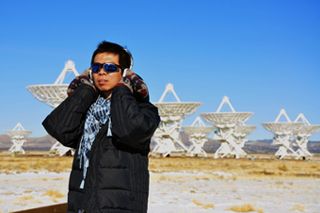
Very Large Array, New Mexico
This course website came out of my visiting lectureship at the Ateneo de Manila University from November 2011 to February 2012. I had moved to the US to pursue a doctorate in chemistry in Texas and Florida, followed by a postdoctoral fellowship in Illinois. Prior to this, I was an instructor at the Ateneo where the course I enjoyed teaching the most was Science and Society or Sci 10. Although it is part of the natural science core curriculum, taught to non-science majors, its interdisciplinarity allowed me to follow ideas wherever they ramified. As an unrepentant contrarian, I naturally gravitate towards authors who destabilize established opinions or puncture scientific myth-making--Paul Feyerabend, Jean-François Lyotard, Marshall McLuhan, Thorsten Veblen, Julian Simon. When Climate Change Science, for example, resorts to "consensus" to prop up its claims and delegitimize opposing views, the more I become skeptical of such claims--especially when these are used to justify governmental overreach. The material, therefore, presented here, while following the general outline of Sci 10 at Ateneo, represents unapologetically my own idiosyncrasies.
What I emphasize throughout is a historical approach to understanding our present scientific, industrial, and post-industrial culture. For example, I include a discussion of Newton in the context of Medieval scholasticism and the rationalism of the Enlightenment, and foreground the modern debates (Popper, Feyerabend, Kuhn) about progress in science and the nature/limits of scientific knowledge. The former is echoed in the treatment of the roots of Industrial Revolution in the clock and the printing press of the Middle Ages (McLuhan) and in the decline of the aristocracy and rise of the bourgeoisie during the Enlightenment. Lyotard's analysis of scientific knowledge submitting to the expedience of technology and mercantilization, and McLuhan's analysis of the power of the formal features of mass media, serves as the basis for a discussion of post-modernity and the information age. I have also tried to be dispassionate and ambivalent in discussing topics that easily devolve into callow liberal activism in universities, such as industrialization and development, consumerism, environmentalism, and climate change. And while the wonders of science (Origin of Life, Origin of the Universe) and modern technology (Biotechnology, Nanotechnology) are presented as truly wonderful products of man, the propensity for heroic myth-making is also uncovered and called out. What comes out, I hope, is an account of what Feyerabend calls "First-world science [as] a science among many" (even if perhaps the most compelling among many) and, ultimately, science itself as a culture among many.
While I developed the course website, the course itself was team-taught in 2011 with Bro. Tony Basilio, who prepared and delivered half of the lectures to the class. The lectures presented here online are my versions of his half, which I prepared long after the fact. I have completed these for myself, as well as a resource from which new instructors of Sci 10 might benefit from. As I have enjoyed the collaboration with Bro. Tony, I have retained his name on the website, but its contents and all their errors are solely my responsibility.
Ted Limpoco
Urbana, IL
Introductory lecture in Google Docs format:
The rest of the 25 lectures is under the Materials page.

No comments:
Post a Comment